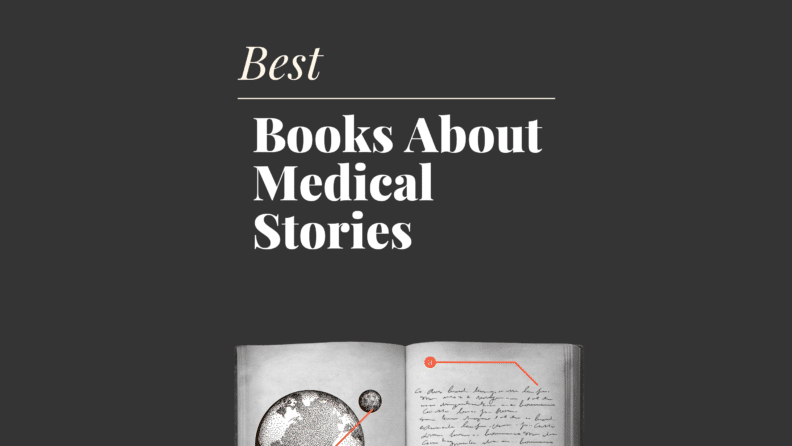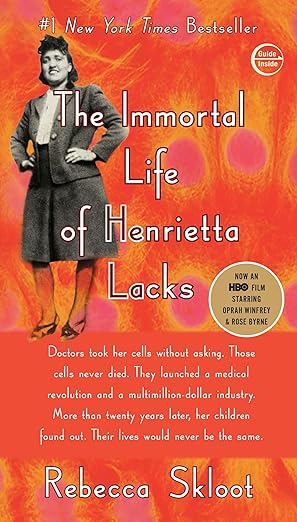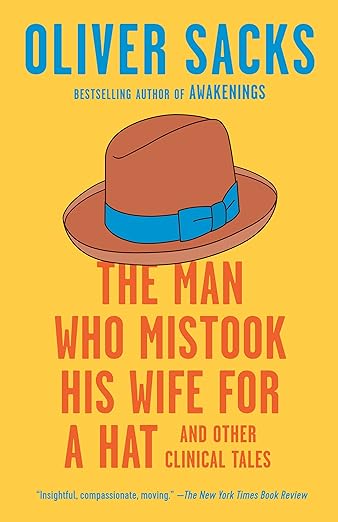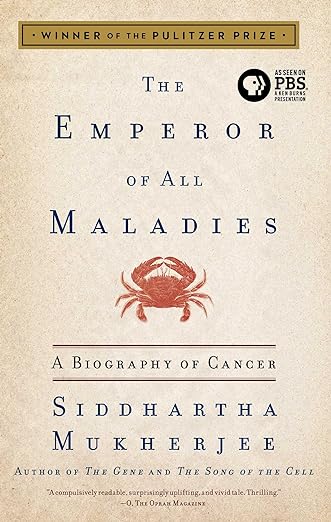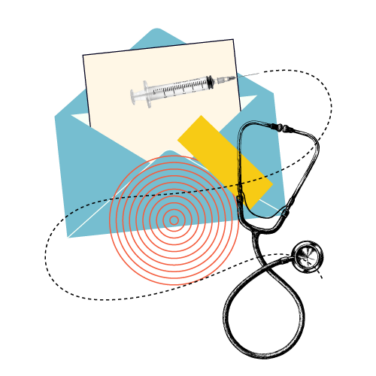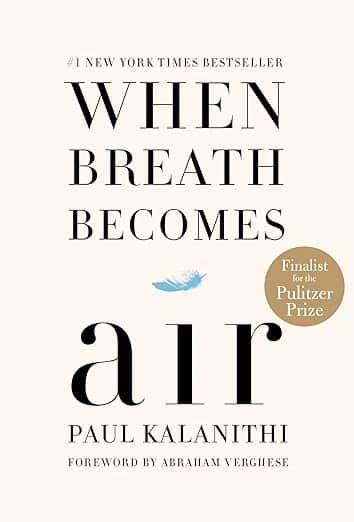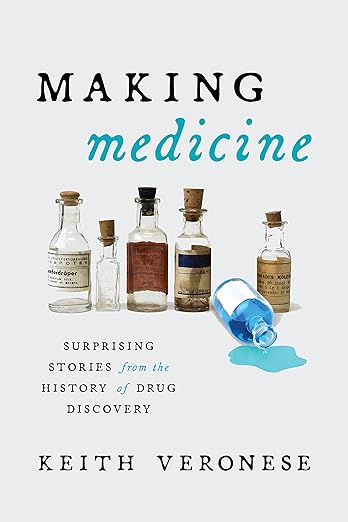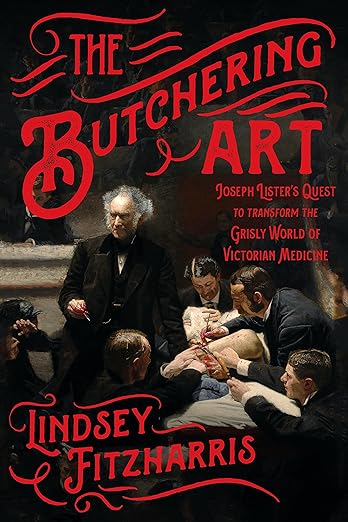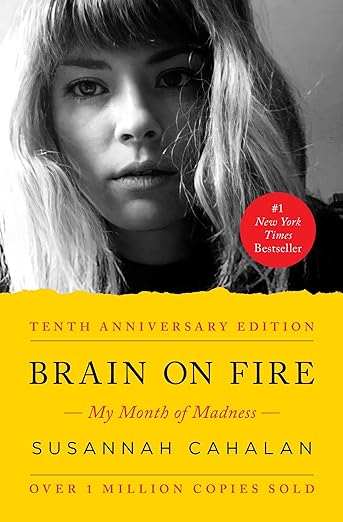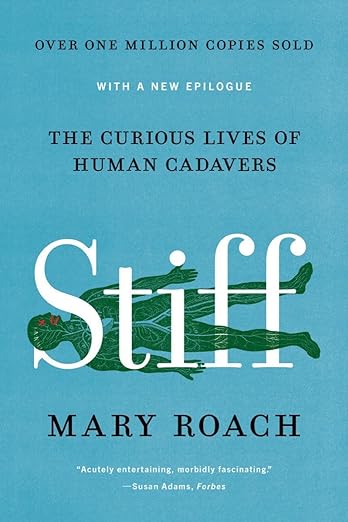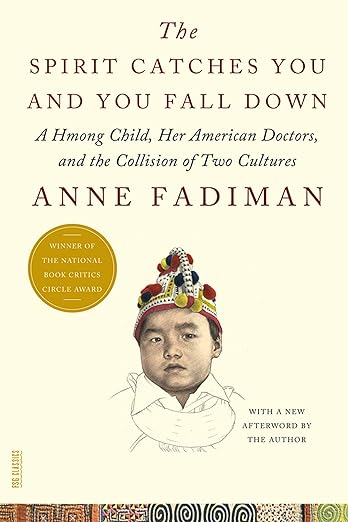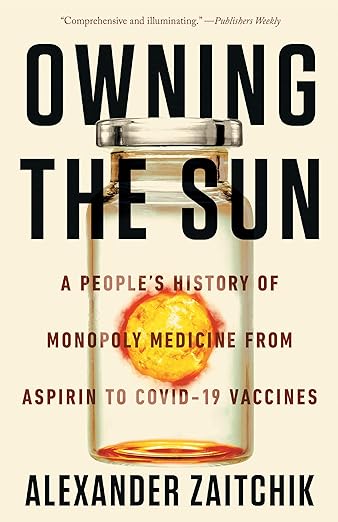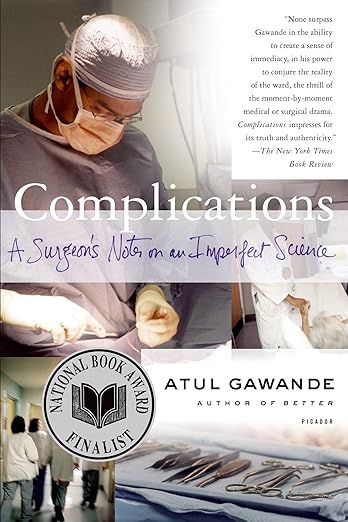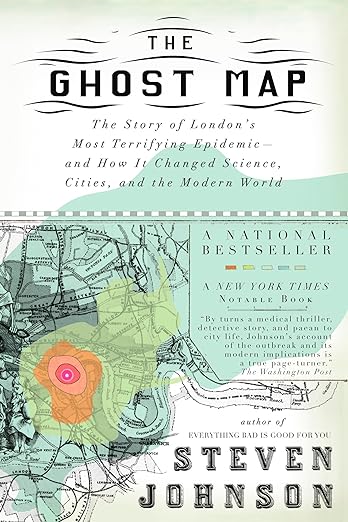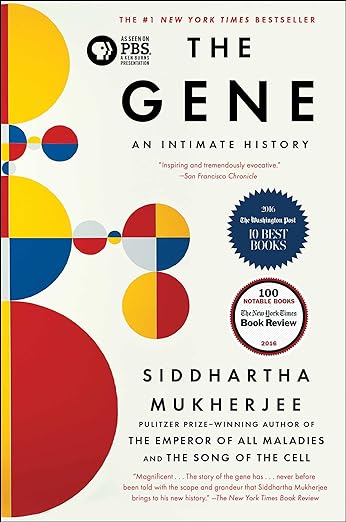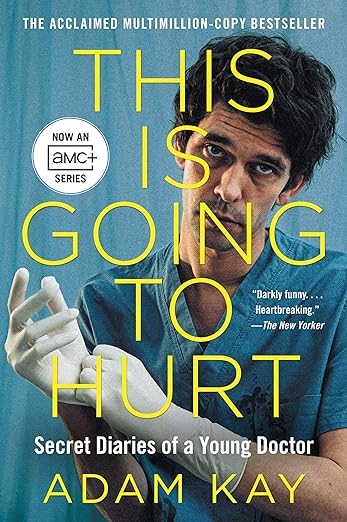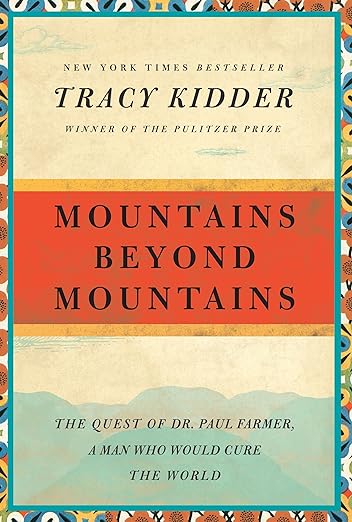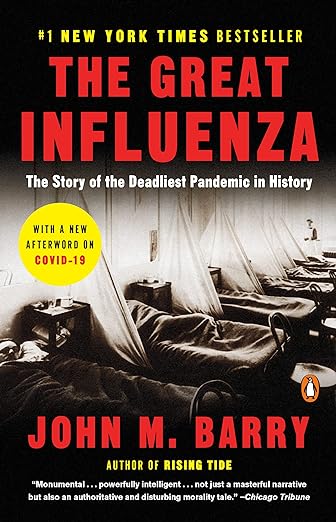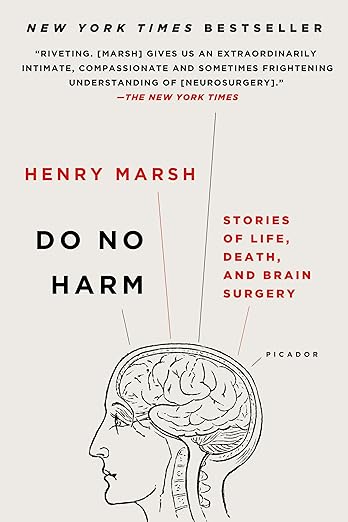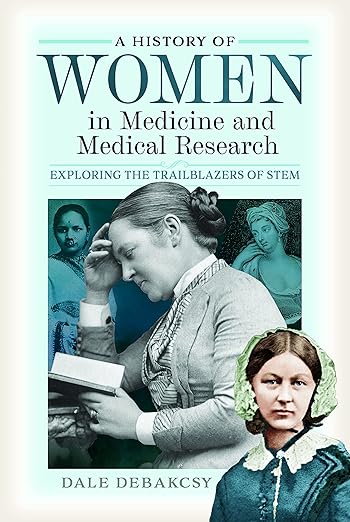Explore a curated list of 19 books that delve into medical stories blending human experience and scientific insights, offering readers comprehensive views on whole-body health and healing.
Henrietta Lacks's cells revolutionized medical research, triggering ethical debates on consent and individual rights in science, as detailed in Rebecca Skloot’s powerful narrative.
Oliver Sacks’s book highlights neurological disorders, illustrating the complexity of the human brain through intriguing case studies that unravel human adaptability and resilience.
Siddhartha Mukherjee’s exploration of cancer in 'The Emperor of All Maladies' combines captivating storytelling with scientific depth, chronicling humanity's evolving battle against this disease.
Atul Gawande captures the uncertainties and moral dilemmas faced in surgery, presenting a transparent look into the complexities and human aspects of medical practice in 'Complications.'
Navigating the captivating world of medical stories—each one a unique blend of human experience and scientific marvel—I’ve discovered the profound depth of the medical field through literature. My extensive journey, steeped in countless books on medical narratives, has enabled me to decipher the intricate dance between medicine and life. I resonate with your longing to delve into the fascinating intersections of humanity and healing, and I assure you, that you're in the right place.
This comprehensive list of holistic medicine books will help you find the best resources for whole body health.
19 Best Books About Medical Stories
I've curated this list to bridge your desire for profound medical stories.
- The Immortal Life of Henrietta Lacks by Rebecca Skloot
- The Man Who Mistook His Wife for a Hat by Oliver Sacks
- The Emperor of All Maladies by Siddhartha Mukherjee
- Being Mortal: Medicine and What Matters in the End by Atul Gawande
- When Breath Becomes Air by Paul Kalanithi
- Making Medicine: Surprising Stories from the History of Drug Discovery by Keith Veronese
- The Butchering Art by Lindsey Fitzharris
- Brain on Fire by Susannah Cahalan
- Stiff: The Curious Lives of Human Cadavers by Mary Roach
- The Spirit Catches You and You Fall Down by Anne Fadiman
- Owning the Sun: A People's History of Monopoly Medicine from Aspirin to COVID-19 Vaccines by Alexander Zaitchik
- Complications: A Surgeon's Notes on an Imperfect Science by Atul Gawande
- The Ghost Map by Steven Johnson
- The Gene: An Intimate History by Siddhartha Mukherjee
- This Is Going to Hurt by Adam Kay
- Mountains Beyond Mountains by Tracy Kidder
- The Great Influenza by John M. Barry
- Do No Harm by Henry Marsh
- A History of Women in Medicine and Medical Research by Dale DeBakcsy
Overviews Of The 19 Best Books About Medical Stories
1. The Immortal Life of Henrietta Lacks by Rebecca Skloot
Summary:
The Immortal Life of Henrietta Lacks navigates the tale of Henrietta Lacks and her instrumental contribution to numerous scientific discoveries. It unveils the entwinement of scientific advancements and ethics, raising pivotal questions about consent and individual rights in medical research.
What You'll Learn:
The substantial impact of Henrietta Lacks's cells on medical science and the persistent ethical deliberations over consent and exploitation in research.
Why You Should Read It:
Melding scientific exploration with poignant human experiences, this narrative incites readers to ponder over the ethical duties of science to its contributors.
Quote From The Book:
"I see no difference between this and the Tuskegee experiment."
About The Author:
Rebecca Skloot is a distinguished science writer with numerous contributions to various notable publications. Follow her on Twitter or visit her LinkedIn.
2. The Man Who Mistook His Wife for a Hat by Oliver Sacks
Summary:
The Man Who Mistook His Wife for a Hat by Oliver Sacks is a fascinating exploration into the world of neurological disorders, showcasing a variety of case studies that illustrate the complexity of the human brain.
What You'll Learn:
The intricacies of different neurological conditions and the human experience and adaptability in dealing with them.
Why You Should Read It:
This book provides enlightening insights into neurology, making complex medical concepts accessible and engaging to the general reader.
Quote From The Book:
"To restore the human subject at the centre - the suffering, afflicted, fighting, human subject - we must deepen a case history to a narrative or tale."
About The Author:
Oliver Sacks was a renowned neurologist and best-selling author, known for his collections of neurological case histories. More about his work can be found on his website and get updates on his Twitter.
3. The Emperor of All Maladies by Siddhartha Mukherjee
Summary:
The Emperor of All Maladies offers a compelling voyage through the history and science of cancer. It offers insights into the nature of cancer, its manifestations, and the ongoing battle against this multifaceted disease.
What You'll Learn:
The evolution of our understanding of cancer, its profound impact on society, and the continuous research and innovations aimed at its cure.
Why You Should Read It:
Mukherjee’s prose makes complex medical ideas accessible to the layperson while revealing the human side of the scientific endeavor to understand and combat cancer.
Quote From The Book:
"This is a history of cancer, it is not a medical textbook, nor does it offer prescriptive advice or definitive explanations."
About The Author:
Siddhartha Mukherjee is a practicing oncologist and a distinguished author who combines profound scientific insight with a compassionate approach to his subjects. Explore more about his work on his website or follow him on Twitter.
4. Being Mortal: Medicine and What Matters in the End by Atul Gawande
Summary:
Being Mortal delves into the intricacies of aging and dying, offering profound insights on how the medical community can better serve patients in their final stages of life.
What You'll Learn:
The essence of comprehensive and compassionate care, focusing on quality of life, for the elderly and terminally ill.
Why You Should Read It:
Gawande's insightful narratives, combining personal stories and reflections, prompt a rethinking of priorities in end-of-life care.
Quote From The Book:
"Our ultimate goal, after all, is not a good death but a good life to the very end."
About The Author:
Atul Gawande is a notable surgeon, writer, and public health researcher. Connect with him on Twitter, or find out more about his influential work on his website.
5. When Breath Becomes Air by Paul Kalanithi
Summary:
In this profound memoir, neurosurgeon Paul Kalanithi, after being diagnosed with stage IV lung cancer, reflects on life, death, and the meaning of existence.
What You'll Learn:
Insights into the convergence of medicine and philosophy, and reflections on embracing existence to the fullest even in the face of mortality.
Why You Should Read It:
Kalanithi’s eloquent and introspective prose provides a profound exploration of the human condition and the pursuit of purpose in the face of mortality.
Quote From The Book:
"I began to realize that coming in such close contact with my own mortality had changed both nothing and everything."
About The Author:
The late Paul Kalanithi was a gifted neurosurgeon and writer. View his legacy about his work on Twitter.
6. Making Medicine by Keith Veronese
Summary:
Making Medicine reveals the untold stories behind the discovery of life-changing drugs, combining science, history, and personal narratives.
What You'll Learn:
The fascinating journeys of drug discoveries and the impacts of these medical breakthroughs on society and individuals.
Why You Should Read It:
Veronese’s engaging storytelling provides a unique view into the world of pharmaceuticals, uncovering the challenges, breakthroughs, and serendipities in drug development.
Quote From The Book:
"The quest to find new medicines to combat illness is one filled with both extreme failure and success."
About The Author:
Keith Veronese is a science writer with a Ph.D. in chemistry. Connect with him on LinkedIn, follow him on Twitter, or read more about his work on his website.
7. The Butchering Art by Lindsey Fitzharris
Summary:
This bestseller book illustrates the revolutionary journey of Joseph Lister, the father of modern surgery, and his pursuit to transform the brutal and hazardous world of Victorian medicine through the introduction of antiseptic surgery.
What You'll Learn:
Insights into the evolution of medical practices during the Victorian era and the life and contributions of Joseph Lister in improving surgical procedures.
Why You Should Read It:
To appreciate the monumental strides made in medicine and surgery, understand the historical context of medical practices, and get a glimpse into the tenacity and vision of pioneers like Joseph Lister.
Quote From The Book:
"He had started his career as an outsider. Now he was the savior of surgical science."
About The Author:
Lindsey Fitzharris is a medical historian and author. Follow her on Twitter, or explore more of her work on her website.
8. Brain on Fire by Susannah Cahalan
Summary:
Brain on Fire is the gripping memoir of Susannah Cahalan, detailing her sudden descent into madness, a rare and life-threatening illness, and her journey to recovery.
What You'll Learn:
A firsthand account of battling a mysterious neurological illness, providing an understanding of the resilience of the human spirit and the advancements in medical diagnosis and treatment.
Why You Should Read It:
To gain a deeper appreciation for mental health, the complexities of the human brain, and the challenges and triumphs of medical investigation and treatment.
Quote From The Book:
"My brain would never be the same again, but I had my mind, and I had my spirit, and I had my family."
About The Author:
Susannah Cahalan is a journalist and author, known for her work on mental health.
9. Stiff: The Curious Lives of Human Cadavers by Mary Roach
Summary:
In Stiff, Mary Roach explores the postmortem journey of the human body, delving into the utilization of cadavers in scientific research, medical training, and much more.
What You'll Learn:
An intriguing exploration of the various applications of human cadavers in science and medicine, providing humorous and respectful insights into death and decomposition.
Why You Should Read It:
To understand the invaluable contribution of cadavers to scientific advancements and to appreciate the fascinating and diverse aspects of postmortem existence.
Quote From The Book:
"Death. It doesn’t have to be boring."
About The Author:
Mary Roach is a bestselling author known for her books on scientific topics.
10. The Spirit Catches You and You Fall Down by Anne Fadiman
Summary:
This book unravels the clash between Western medicine and the traditional beliefs of a Hmong family whose daughter suffers from epilepsy, showcasing cultural misunderstandings and the importance of empathy in healthcare.
What You'll Learn:
The readers will gain insights into the cultural barriers and diverse health beliefs that impact patient care and will understand the importance of culturally competent healthcare.
Why You Should Read It:
To explore the intersection of culture and medicine and to appreciate the need for understanding and respecting diverse cultural beliefs in healthcare.
Quote From The Book:
"The Hmong have a phrase, hais cuaj txub kaum txub, which means 'to speak of all kinds of things.' It is often used at the beginning of an oral narrative as a way of reminding the listeners that the world is full of things that may not seem to be connected but actually are; that no event occurs in isolation; that you can miss a lot by sticking to the point; and that the storyteller is likely to be rather long-winded."
About The Author:
Anne Fadiman is an author, essayist, editor, and teacher.
11. Owning the Sun by Alexander Zaitchik
Summary:
Alexander Zaitchik dives into the extensive history of pharmaceutical monopolies, illustrating the progression and impact of patent medicines from aspirin to the contemporary era of COVID-19 vaccines.
What You'll Learn:
The development and evolution of drug monopolies and their societal and economic ramifications, providing a comprehensive look at the interplay between medicine and monopoly.
Why You Should Read It:
To grasp the influence of monopolies on medicine availability and affordability and to understand the ongoing debates surrounding medicine patents and public health.
Quote From The Book:
"The public owns the sun, and the question is, does it own the sunlight?"
About The Author:
Alexander Zaitchik is a freelance journalist and author.
12. Complications: A Surgeon's Notes on an Imperfect Science by Atul Gawande
Summary:
Complications explore the intricacies and uncertainties of being a surgeon. Atul Gawande provides a transparent look and true story into the challenges and moral dilemmas faced by those in the surgical field.
What You'll Learn:
Insights into the imperfect science of surgery, the ethical quandaries, and the human aspects of practicing medicine, revealing the vulnerabilities and learning curves of surgeons.
Why You Should Read It:
To gain a nuanced perspective on the complexities inherent in surgical practice and to understand the continual learning and adaptation involved in medical professions.
Quote From The Book:
"In surgery, as in anything else, skill and confidence are learned through experience, haltingly and humiliatingly."
About The Author:
Atul Gawande is a surgeon, writer, and public health researcher. Stay updated with him on Twitter, or read more about his initiatives on his website.
13. The Ghost Map by Steven Johnson
Summary:
Steven Johnson narrates the story of the 1854 London cholera outbreak and the pioneering work of Dr. John Snow and Reverend Henry Whitehead, whose investigations into the epidemic changed the understanding of diseases and laid the foundations for modern urban planning and epidemiology.
What You'll Learn:
Readers will learn about the history of epidemiology, the development of modern urban sanitation, and the impact of scientific inquiry and collaboration in addressing public health crises.
Why You Should Read It:
To understand the evolution of disease mapping and its influence on modern epidemiology and urban development.
Quote From The Book:
"Part of the resistance to Snow’s map was a basic, ontological skepticism about the trustworthiness of a map."
About The Author:
Steven Johnson is an acclaimed author and co-creator of the podcast "American Innovations". For more of his work and insights, follow him on Twitter, or visit his website.
14. The Gene: An Intimate History by Siddhartha Mukherjee
Summary:
Siddhartha Mukherjee charts the discovery and understanding of the gene, interweaving science, history, and personal narrative to explore the implications of genetic research on human identity and the moral questions it raises.
What You'll Learn:
The development of genetic science from Mendel’s experiments to CRISPR technology, and the ethical and philosophical considerations in genetic engineering and therapy.
Why You Should Read It:
To gain a deeper understanding of the history and future of genetics and reflect on the profound questions it poses about nature, nurture, and what it means to be human.
Quote From The Book:
"This is the story of the birth, growth, and future of one of the most powerful and dangerous ideas in the history of science: the gene, the fundamental unit of heredity, and the basic unit of all biological information."
About The Author:
Siddhartha Mukherjee is a renowned physician, scientist, and author. To stay updated, follow him on Twitter, or visit his website.
15. This Is Going to Hurt by Adam Kay
Summary:
Adam Kay provides a candid and often humorous account of his experiences as a young doctor, shedding light on the highs and lows of working in the NHS and offering a poignant look at the challenges and rewards of a medical career in modern medicine.
What You'll Learn:
Readers will gain insights into the life and challenges of a junior doctor in this nonfiction book, the inner workings of the healthcare system, and the emotional and practical realities of medical practice.
Why You Should Read It:
To explore the personal and professional tribulations of a doctor in the modern healthcare system and to gain a greater appreciation for the dedication and resilience of medical professionals.
Quote From The Book:
“So I told them the truth: the hours are terrible, the pay is terrible, the conditions are terrible; you’re underappreciated, unsupported, disrespected, and frequently physically endangered. But there’s no better job in the world.”
About The Author:
Adam Kay is a former doctor and a best-selling author.
16. Mountains Beyond Mountains by Tracy Kidder
Summary:
Tracy Kidder chronicles the life and work of Dr. Paul Farmer, a physician dedicated to addressing public health crises in impoverished communities. The book follows Farmer’s relentless pursuits to combat diseases in Haiti, Peru, and Russia, underscoring his unwavering commitment to healthcare equity.
What You'll Learn:
Readers will understand the deep disparities in global healthcare and learn about the innovative approaches and steadfast resolve needed to address healthcare inequalities.
Why You Should Read It:
To be inspired by the extraordinary journey of a man driven by a profound sense of justice and humanity and to reflect on the role of individual commitment in addressing global health issues.
Quote From The Book:
“For me, an area of moral clarity is: you’re in front of someone who’s suffering and you have the tools at your disposal to alleviate that suffering or even eradicate it, and you act.”
About The Author:
Tracy Kidder is a distinguished author known for his compelling narrative nonfiction works.
17. The Great Influenza by John M. Barry
Summary:
John M. Barry delves into the 1918 influenza pandemic, analyzing its origins, its spread, and its profound impact on society. The book combines meticulous research with gripping narratives, illustrating the struggle of the medical community to understand and combat the deadly virus amidst the chaos of World War I.
What You'll Learn:
The history of the 1918 influenza pandemic, the scientific and societal responses to it, and the enduring lessons it offers for managing and mitigating pandemics.
Why You Should Read It:
To gain a deeper understanding of one of the deadliest pandemics and infectious diseases in history and to reflect on the interplay of science, politics, and society in times of global health crises.
Quote From The Book:
“The deadliest enemy faced by human beings, the one with the greatest potential to kill—barring man himself—is influenza.”
About The Author:
John M. Barry is a noted author and historian.
18. Do No Harm by Henry Marsh
Summary:
Henry Marsh, a leading neurosurgeon, provides a deeply personal account of his career in brain surgery. He shares candid reflections on the profound challenges and ethical dilemmas surgeons face, the intricate beauty of the human brain, and the poignant stories of patients he has treated.
What You'll Learn:
Readers will gain insights into the complexities of neurosurgery, the moral and emotional challenges inherent in surgical practice, and the profound impact of medical decisions on patients’ lives.
Why You Should Read It:
To explore the intricate and profound world of brain surgery and to gain a deeper understanding of the ethical, emotional, and professional dimensions of medical practice.
Quote From The Book:
“You sit in a consulting room with a patient and their family. You are the expert, the one with the knowledge, the one who makes the decisions. You are the one who can offer hope, or take it away.”
About The Author:
Henry Marsh is a renowned neurosurgeon and author. Check out more of his work on his Twitter.
19. A History of Women in Medicine and Medical Research by Dale DeBakcsy
Summary:
Dale DeBakcsy outlines the contributions of women to medicine and medical research, highlighting their pivotal roles and relentless pursuits in the STEM fields. The book chronicles the challenges these women faced, their groundbreaking discoveries and their enduring impacts on science and medicine.
What You'll Learn:
Readers will learn about the significant contributions of women in medicine and medical research, and how they overcame societal and professional barriers to leave lasting legacies in the STEM fields.
Why You Should Read It:
To appreciate the depth and breadth of women’s contributions to medical science and to understand the importance of diversity and inclusion in advancing scientific knowledge and practice.
Quote From The Book:
“Through every age, there have been women using science to better the human condition, against much societal pressure.”
About The Author:
Dale DeBakcsy is an author specializing in historical narratives. Connect with Dale on Twitter, and discover more about his work and his insights into historical developments and personalities.
Which Books About Medical Stories Do You Recommend?
I hope you find this selection insightful and valuable in exploring the diverse facets and history of medicine. If there are additional titles you believe should be on this list, please feel free to suggest them. We appreciate your input in making this compilation as comprehensive and enlightening as possible.
To stay updated on the latest trends, best practices, and solutions related to your medical practice, subscribe to The Medical Practice newsletter.


